The COVID-19 pandemic, particularly during the beginning of its spread in early 2020, caused a halt in most processes and activities globally to curb its transmission and to give time for scientists to determine how best to deal with the disease. However, the restrictions greatly affected the administration of programs for and, thus, the delivery of services to communities and populations affected by tuberculosis, HIV&AIDS, and malaria, including efforts to strengthen the capacities of key vulnerable populations and last mile populations in engaging and participating in health governance.
The second CELG webinar was held on the 31st of October 2023. The purpose of the second session is to provide a platform for participating organizations to share:
- challenges and gaps they encountered in the administration of programs and in the delivery of services, particularly for strengthening the capacities of KVPs and LMPs to engage governments, due to the pandemic and to the responses initiated by their national governments to manage the pandemic, and
- lessons learned and recommendations with regards to preparing their organizations for pandemics particularly in the aspects of program management and service delivery, particularly those related to strengthening KVP and LMP engagement and participation
The webinar was designed to provide opportunities to share lessons from both the regional and country-level organizations working with and/or coordinating with key vulnerable populations and last mile populations.
For the regional-level organization, Jeffry Acaba, in behalf of APCASO, presented the result of their study entitled “Asia Pacific Rapid Assessment on Key and Emerging Issues of HIV, TB, Malaria-Affected Communities and Civil Society during the COVID-19 Pandemic.” The study conducted in 2020 aimed to assess the initial impact of COVID-19 on programs and services for communities and vulnerable groups supported by The Global Fund. The report showed a disruption in the delivery of services due to closures and shortened operating hours, causing difficulties for key vulnerable populations in accessing preventive and treatment services. These difficulties were documented to be further confounded by economic losses and travel restrictions. The study also documented how Global Fund supported civil society and key population-led organizations integrated COVID-19 in their existing programs, including through reallocation of funds, advocating/lobbying for integration of the needs of communities and vulnerable populations in COVID-19 related policies, and adjustments in service delivery mechanisms.
The experiences of three country-level organizations were then presented:
- Jaringan Indonesia Positif (JIP), an network of organizations working with the PLHIV community in Indonesia, was represented by Kresna Wahyu.
- Civil Society Movement Against Tuberculosis (CISMAT), an advocacy and rights-based network implementing Tuberculosis-healthcare based in Sierra Leone, was represented by Paul Brima Bangura.
- Janna Health Foundation, a nongovernmental organization that focuses on providing access to medical services, particularly for HIV&AIDS, TB, and Leprosy, as part of building sustainable development in Nigeria, was represented by Paul Balogun.
All organizations from the three countries mentioned that they were not prepared for the effects of the pandemic and the restrictions required to control it. Program administration and service delivery to partner vulnerable populations were severely disrupted. These were due to the following identified factors:
- In Indonesia, initially, government guidelines related to COVID-19 were not sensitive to the needs of PLHIV. This caused a temporary disruption in the delivery of services to patients.
- In Sierra Leone, fear of being identified as COVID-19 suspects prevented patients from consulting and accessing care, causing a decline in program results.
- Many key vulnerable groups in Sierra Leone had many misconceptions and false information about COVID-19 that prevented them from accessing care and preventive services such as immunizations.
- Travel restrictions also prevented fieldwork causing decreased engagement with communities and key vulnerable groups, particularly patients with TB in remote areas in Sierra Leone and nomadic tribes in Nigeria. Furthermore, key vulnerable groups were more at-risk for exclusion due to poor access to preventive services such as masks.
- Janna Health Foundation of Nigeria reported that the restrictions interrupted health care supply chains caused delays in the distribution of health supplies and in the implementation of campaigns.
All the organizations, both from the regional and country-level, realized the need to adjust to the limitations and to the opportunities presented by the pandemic and the required restrictions to control it. The facilitator summarized the reports into several themes that emerged as lessons:
- The need for contingency planning for possible disruptions, including allocating resources and providing mechanisms for reallocation, at all levels.
- The need for spaces for multi-level, multisectoral coordination, especially with governments and the inclusion of vulnerable populations, in preparation for and in response to pandemics to ensure that community responses are aligned with national strategies and that the needs of vulnerable groups are integrated in mandates and protocols.
- The need to improve data collection and management to be used as basis for decision-making for policy and program changes, especially during times of crisis and shock.
- The need to strengthen the capacities of communities and vulnerable groups to provide basic services and engage in governance of health programs to better handle shocks to the health system in times of crises.
- The need for organizational flexibility to adjust program administration and service delivery processes and mechanisms, including those focused on engaging and empowering communities, key vulnerable populations, and last mile populations.
As a closing and with the lessons in mind, Dr. Jeremiah Alejo, introduced the topic of the next webinar, which will focus on the presentation of the projects of the partner organizations to strengthen the capacities of the partner KVP and LMP -led organizations to engage in pandemic preparedness and governance.
The presentations can be accessed by clicking or copying and pasting the following link to your browser: https://drive.google.com/drive/folders/1mpLCSpGqAyAturQCl3TZtDBW60VkxnRd



